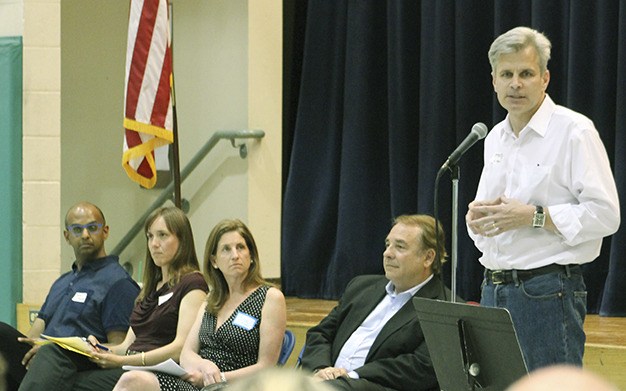Over 100 people turned out for an ‘informational’ meeting about K-12 education funding last Thursday night at West Mercer Elementary. The event featured a panel of speakers that included state legislators Sen. Steve Litzow and Rep. Tana Senn.
Mercer Island Schools Superintendent Dr. Gary Plano also spoke, as did Education Association president Tani Lindquist and Schools Foundation co-president David D’Souza.
Plano opened the meeting, saying fully funding education was an “old problem” dating back to the 1960s and ‘70s.
“There has always been tension in this state around funding public schools,” Plano said. “We have a unique constitution, unique in the sense that the paramount duty of the state government is to provide ample and basic education. That is different from any of the other 49 states.”
Litzow said as a father of four who have all been through the Mercer Island school system, his goal as a senator was to bring the rest of the schools around the state up to a level like Mercer Island. He said legislators were “currently in the middle of negotiations as we speak” for bills regarding issues such as the budget, 1351 and levy reform.
Litzow said this year’s budget had $18 billion for basic education funding, $1.3 billion to address McCleary funding and a three percent cost of living adjustment for teachers. Where there was disagreement among legislators was in regards to issues about funding for non-basic education, a debate he said would continue on for another couple of weeks.
Regarding local levies, Litzow claimed Mercer Island would have more money to augment basic education than it does now. He said legislators were currently working on a project that, if passed, would increase the amount of spending by $800 per student to supplement basic education.
“We’re going to have more money to spend on basic ed when we can continue to put more money into the system,” Litzow said.
Senn said education was one of the main reasons why she ran for Legislature. She said while legislators generally all agree there needs to be more money for education, the issue is figuring out where that money will come from. She noted with growing school populations over Washington’s 295 school districts, the state’s responsibility to pay for every one of those students was ultimately stretching the budget.
“There are a lot of issues remaining to deal with the budget overall, certainly with education,” Senn said. “The devil will be in the details and there’s lots of moving parts right now. Unfortunately, all I can say at this point is stay tuned.”
Lindquist explained the MIEA’s recent walkout against the Legislature, saying Mercer Island teachers felt obligated to stand with other teachers who didn’t work in supportive communities like Mercer Island that can raise millions of dollars every year to support the school district.
“We’ve raised these monies originally to ‘bridge the gap,’ the gap caused by the lack of funding from the state. It’s more than a gap; it’s a cavern. It feels like an abyss at times,” Lindquist said. “We felt like we had to stand shoulder-to-shoulder with other educators from across the state to say ‘what’s happening now is not working, and our kids are paying the price.’”
Questions from the audience afterward primarily dealt with teacher salaries and benefits. One audience member asked the legislators why after voting for smaller class sizes and teacher raises, nothing seemed to happen.
“Citizens voted for 732, they voted for 1351. At the same time, they voted down car tabs, they voted against the income tax, they voted to not tax on water and candy and soda. And so you can’t fund unicorns without a funding mechanism,” Senn said. “Unfortunately what has happened is we have great policy with no way to fund it.”
MIHS counselor M.J. Hillstrom, an educator of 42 years, noted the decrease of educators coming into the teaching profession. She said state legislators had not provided a cost of living increase in six years and had frozen state funds for teachers’ health insurance dating back to 2010.
“Don’t we need to provide professional and competitive pay and benefits to attract, and keep, qualified parent-educators for our kids?” she asked.
“Frankly, if I were 147 people, you all would have significant raises,” Senn said. “Absolutely, we need teachers to come to our schools, to live in our communities… I think it’s really unfortunate we’ve not been able to do it.”
But Senn alluded it came down to a choice between funding for education or having lower taxes.
“For 20-25 years, this issue has been brought to Supreme Court numerous times. We are at such a thin line with what we’ve cut in other programs over the years that there are things that we only fund now for court cases and emergencies, and this is a court case,” she said. “We will get to it, but unfortunately to the minimum unless we have additional revenue.”
The recurring theme the legislators stressed was that budget issues were still a work in progress, with lots of people in Olympia currently working on a plan to fully fund education. They encouraged community members to continue sending input for what the Legislature should be doing.
“It’s not going to happen overnight, frustratingly,” Senn said. “Please do keep advocating. I’m definitely pushing hard for education, it’s a key reason why I’m down there.”
“Do stay engaged, do try and track what is going on and do communicate with your representatives,” Lindquist said. “It’s very important that we continue the conversation.”


